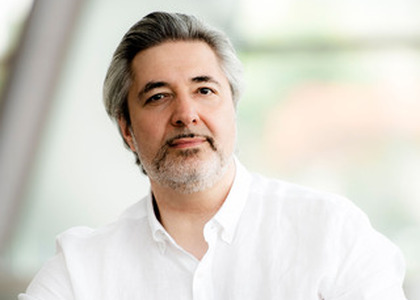> Interviews

Interview with Russian conductor Daniel Raiskin
Mr. Daniel Raiskin, you are coming to Romania for the first time to conduct the concert of the National Radio Orchestra on Friday, April 19th. What are your impressions from the first rehearsals with the ensemble?
Firstof all, it's very strange that, in my many travels in recent years, Romania has never appeared on this list by chance. So, I am very happy to have the opportunity to be here, in Bucharest, thank you for the invitation! I was even more delighted to accept the invitation when I found out that my friend, Alexei Volodin, will be the soloist.
My first impressions are very positive! This is a wonderful program, Brahms's music is incredible, full of poetry, love, beauty, and melody.
I feel that the musicians in the ensemble are very interested and truly love what they do. We are now at the moment of getting to know each other, identifying how each of us reacts to the music we are making, and I am trying to feel how I can inspire them to give their best for this concert. Of course, both the orchestra members and I are very familiar with these works, but the purpose of rehearsals is to create a common, unified vision.
How would you describe the professional relationship you have with pianist Alexei Volodin?
Between us, there is a wonderful friendship, both personal and musical, of almost 20 years. I think we have performed together about 30 different piano concerts so far. He is an artist with an impressive repertoire of over 65 concertante works; we have performed many of them together - Beethoven's concerts, Rachmaninoff's, many Mozartian concerts... name a concert, and we'vedefinitely performed it. For me, this month is almost an Alexei Volodin festival because after this week, we will go to Belgrade, then to Bratislava. He will be very busy, but I am very happy because we have this friendship and this musical partnership, where trust is mutual - he trusts that I always prepare the orchestra as best as possible before our first rehearsal together, and that I will listen to him very carefully to help him express his musical ideas as clearly as possible. Soit's not just about being together, whether the orchestra is loud enough or not, but about this trust that the soloist can have in the conductor and the orchestra. Also, the pianist must listen to the ensemble. Brahms's first piano concert is more than just a concertante work, I would say it is a symphony with a piano, even his first symphony, before he composed the piece he named Symphony No. 1.
In the current season, the Radio Orchestras are performing the complete symphonies and concertante works of Brahms. How would you describe his orchestration style and the Symphony No. 4?
This program is truly unique because it is, in a way, like an arc, like a trajectory that Brahms the symphonist traced in his creation. Inevitably, the first piano concert is his first attempt to conquer a symphonic genre, and he uses the piano, which he himself played very well, to help him achieve this. But it is truly a symphony in three parts, where both the piano and the orchestral ensemble play a very important role. Symphony No. 4 is truly the peak of his evolution as an orchestrator. It is very interesting to observe how the first steps in the symphonic genre are reflected in the Piano Concerto No. 1 and how they reach perfection in his last symphony. One thing that Brahms preserved from the beginning of his approach to symphonic music until the end was his incredible sense of orchestral poetry and color, which he achieved through various instrumental combinations.
Translated by Ramona Ana-Maria Ionescu,
University of Bucharest, Faculty of Foreign Languages and Literatures, MTTLC, year I
Corrected by Silvia Petrescu














